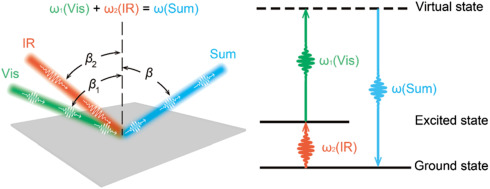Sum frequency generation: Difference between revisions
No edit summary |
|||
| Line 29: | Line 29: | ||
<span style="color:red">RmTimeRev </span> # Remove Time Reversal | <span style="color:red">RmTimeRev </span> # Remove Time Reversal | ||
#RmSpaceInv # Remove Spatial Inversion | #RmSpaceInv # Remove Spatial Inversion | ||
== Real-time simulation with two external fields == | |||
== Analysis of the results == | |||
== Comparison with SHG == | |||
Revision as of 13:54, 18 April 2024
In this tutorial we will show how to calculate Sum Frequency Generation(SFG) and also Difference Frequency Generation (DFG) in bulk materials.
We suppose you are already familiar with the non-linear response using the Yambo code.
If it is not the case please study the previous tutorials:
Linear response using Dynamical Berry Phase and Real time approach to non-linear response (SHG).
DFT calculations
In this example, we will consider a single layer of hexagonal boron nitride (hBN). If you didn't before you can download input files and Yambo databases for this tutorial here: hBN-2D-RT.tar.gz. and/or follow the instructions to generate the databases here: Prerequisites for Real Time propagation with Yambo
Removing symmetries
In this tutorial we will calculate the SFG along when both fields are in the 'y' direction,
therefore we remove symmetries not compatible with an external field along this direction, with the command ypp_nl -y:
fixsyms # [R] Remove symmetries not consistent with an external perturbation % Efield1 0.000000 | 1.000000 | 0.000000 | # First external Electric Field % % Efield2 0.000000 | 0.000000 | 0.000000 | # Additional external Electric Field % BField= 0.000000 T # [MAG] Magnetic field modulus Bpsi= 0.000000 deg # [MAG] Magnetic field psi angle [degree] Btheta= 0.000000 deg # [MAG] Magnetic field theta angle [degree] #RmAllSymm # Remove all symmetries RmTimeRev # Remove Time Reversal #RmSpaceInv # Remove Spatial Inversion
